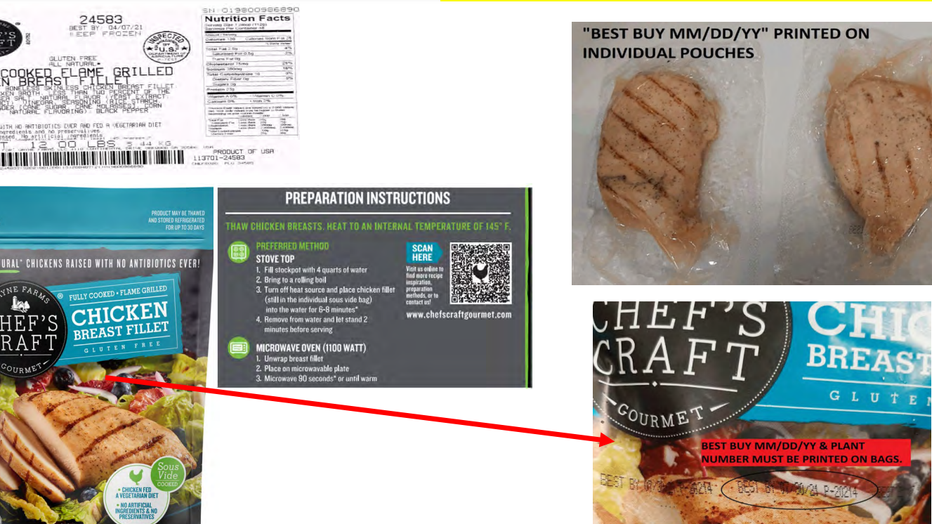Chicken recall: Nearly 600K pounds of ready-to-eat chicken breasts may be undercooked
DECATUR, Ala. - Alabama-based Wayne Farms is recalling about 585,000 pounds of ready-to-eat chicken breast fillets that may be undercooked.
According to the USDA, the products were made between Feb. 9 and April 30.
Here’s what’s under recall:
- 9-lb. cases containing 8 packages of 6-oz "ALL NATURAL FIRE GRILLED CHICKEN BREAST" with "use by" dates ranging from 5/10/22 to 4/29/23.
- 9-lb. cases containing 12 packages of 4-oz* "*ALL NATURAL FIRE GRILLED CHICKEN BREAST" with "use by" dates ranging from 5/10/22 to 4/29/23.
- 6-lb. cases containing 24 individual packages of 4-oz *"*ALL NATURAL FIRE GRILLED CHICKEN BREAST FILLET" with "use by" date 3/5/23.
- 16-oz. zippered plastic packages containing *"*CHEF’S CRAFT CHICKEN BREAST FILLET" and establishment number P-20214 printed next to the 3/23/2023 best by date.
The recalled products will have "EST. 20214" on the case and packaging. They were shipped to distributors across the country and then redistributed to restaurants and stores. The stores they were sent to are in North Carolina, South Carolina and Virginia.

Examples of what the recalled chicken products may look like (Credit: USDA)
Investigators say the problem was discovered when someone called the company to complain that the chicken appeared undercooked. No illnesses have been reported in connection with the recall.
RELATED: Over 100 Elite-brand kosher candy, chocolate products recalled due to salmonella risk
The USDA says the products should be thrown away or returned to where they were bought.
Eating undercooked chicken
According to the U.S. Centers for Disease Control and Prevention, chicken is the most consumed meat in America. Raw or undercooked chicken if often contaminated with various bacteria that can cause food poisoning. You can also get sick from foods or drinks that are contaminated by raw chicken or its juices.
Here are some steps you can take to avoid food poisoning from chicken, courtesy of the CDC:
- Place chicken in a disposable bag before putting it in your shopping cart or refrigerator to keep raw juices from getting onto other foods.
- Wash hands with warm, soapy water for 20 seconds before and after handling chicken.
- Do not wash raw chicken. During washing, chicken juices can spread in the kitchen and contaminate other foods, utensils, and countertops.
- Use a separate cutting board for raw chicken.
- Never place cooked food or fresh produce on a plate, cutting board, or other surface that previously held raw chicken.
- Wash cutting boards, utensils, dishes, and countertops with hot soapy water after preparing chicken and before you prepare the next item.
- Use a food thermometer external icon to make sure chicken is cooked to a safe internal temperature of 165°F.
- If cooking a microwaveable meal that includes frozen raw chicken, handle it as you would fresh raw chicken. Follow cooking directions carefully to prevent food poisoning.
- If you think the chicken you are served at a restaurant or anywhere else is not fully cooked, send it back for more cooking.
- Refrigerate or freeze leftover chicken within 2 hours (or within 1 hour if the food is exposed to temperatures above 90°F, like a hot car or summer picnic).


